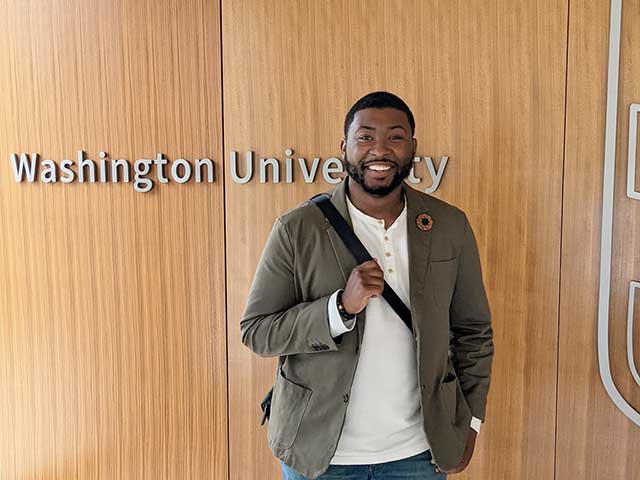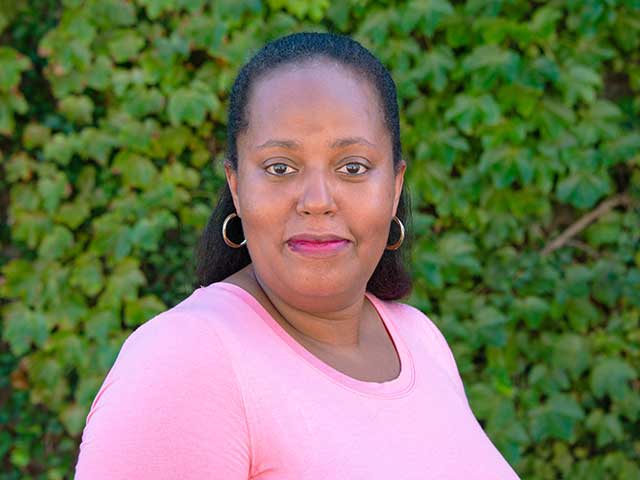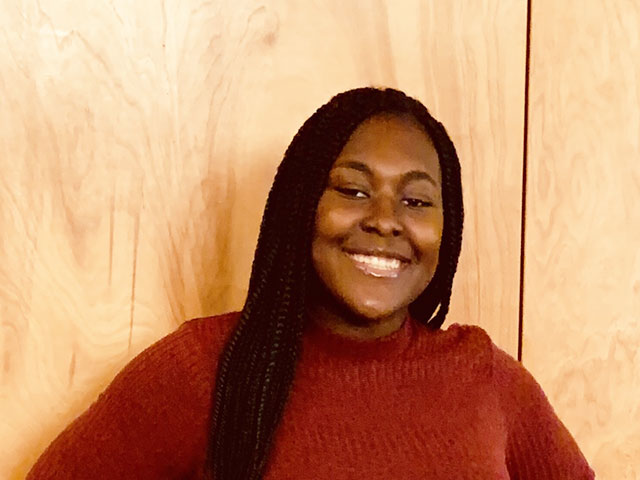Black Botanists Week 2022: Celebrating Black Scientists at the Danforth Center
This year in celebration of Black Botanists Week 2022, we are excited to put a spotlight on the work of Vincent (Antonio) Brazelton Jr., Dr. Tessa Burch-Smith, and Taraya Dwight.
Antonio is part of Dr. Chris Topp’s lab and a graduate student at Washington University. His research combines plant phenomics and social science to improve trait selection for urban agriculture.
Tessa Burch-Smith is an Associate Member and Principal Investigator at the Danforth Center. Her work investigates communication between plant cells and between plants and viruses to improve crop yield and resistance to infection.
Taraya Dwight is a student at Delaware State University and an REU intern in Dr. Malia Gehan’s lab at the Danforth Center this summer. In the Gehan Lab, she is researching the effects of heat stress on in vitro germination of quinoa pollen.
Keep reading to learn more about their research and their passion for plant science.
Meet Antonio Brazelton

Antonio Brazelton is a graduate student in Dr. Chris Topp’s lab
Antonio Brazelton studies root trait diversity in Brassica oleracea viridis, better known as collard greens. Collards are a nutrient-dense, leafy green grown on urban farms and community gardens throughout the St. Louis metro region. “Beyond their nutritional importance, they are also a significant cultural staple in many southern and African diasporic foodways,” says Antonio. “As social and environmental factors continue to widen the food disparity gap across cities, it is imperative that we develop crops that are adapted to urban and low-input agricultural systems. Understanding the genetic diversity that exists in collard roots will help me work alongside urban farmers to select plant traits that are best adapted for urban crop production.”
What inspired you to pursue science?
I was formally introduced to plant science during my junior year of high school. I was an REU student studying peanut transformation. It was my first time seeing tissue culture and I remember thinking “This could feed the world!” Since that experience, I’ve spent the last decade doing plant science work. Over time, I’ve learned that feeding the world is as much about challenging the boundaries of technology, as it is about challenging the boundaries of the social environment that they exist in. The idea that my work can have a lasting impact on foodways continues to inspire me to do science today.
Why are you passionate about plants?
Plants are some of the most fascinating history books that we have! They house millennia of information about how different cultures, and microbial interactions shaped the world that we currently live in. Plants are a phenomenal tool at the intersection of social and applied science. They scavenge for their own food, they clean the air, they provide us with medicine, and (most of them) taste great! I think it’s pretty cool that I get to use plants as a resource to create solutions that prioritize food sovereignty, environmental sustainability, and improved genetic diversity for urban farmers and the communities they serve.
Meet Dr. Tessa Burch-Smith

Tessa Burch-Smith, PhD, is an Associate Member and Principal Investigator at the Danforth Center
Dr. Tessa Burch-Smith’s research is focused on how plant cells communicate with each other through intercellular pores called plasmodesmata (PD). Plants are actually a vast network of interconnected cells that exchange essential molecules like sugars, proteins and RNA through PD during growth and development. Viruses exploit PD pores to move from cell to cell as they spread through plants.
What inspired you to pursue science?
I was always curious about how the world works. Pursuing a career in science not only allows me to indulge my curiosity but also opens the possibility of producing solutions to real-world problems.
Why are you passionate about plants?
I am impressed by the resilience of plants in the face of numerous challenges from the environment, pathogens and humans. Their biochemical prowess has provided us with so many benefits over the course of human history, and it is likely that solutions to many of our problems lik pollution and hunger, will be solved through the thoughtful application of plant-based solutions.
Meet Taraya Dwight

Taraya Dwight, student at Delaware State University and an REU intern in Dr. Malia Gehan’s lab at the Danforth Center this summer
Taraya Dwight is a student at Delaware State University and an REU intern in Dr. Malia Gehan’s lab at the Danforth Center this summer. In the Gehan Lab, she is researching the effects of heat stress on in vitro germination of quinoa pollen.
What inspired you to pursue science?
Science has always been my favorite subject. I love learning new things and seeing life at the microscopic level.
What do you love about working with plants?
I love working with plants to see how they respond to their environment. It's cool to observe their behaviors and what stresses they function best in.
We are honored to be able to celebrate Antonio, Tessa, and Taraya for Black Botanists Week, because we believe that the strength of the Danforth Center community and the plant science community lives in the diversity of our scientists. While it is proven that diversity in the plant sciences creates more innovation and problem-solving, the Danforth Center also believes that being a diverse, equitable, and inclusive organization is a priority to building our community.
Thank you to Antonio, Tessa, and Taraya for all that you do for the Danforth Center and the plant science community. Follow along with #BlackBotanistsWeek on Twitter to meet more Black Botanists!